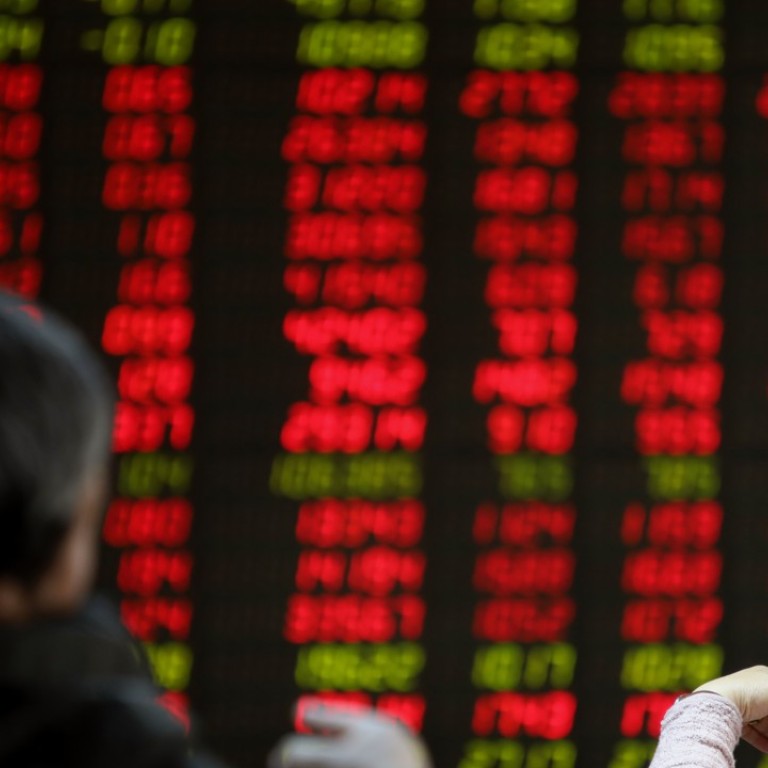
Xi and Trump’s 90-day trade war truce pushes up stocks in mainland China, Hong Kong
Stocks listed in mainland China and Hong Kong rose on Monday after Chinese president Xi Jinping and his US counterpart, Donald Trump, reached an agreement over the weekend to de-escalate the US-China trade war.
On the mainland, the benchmark Shanghai Composite Index rose by 2.6 per cent to 2,654.8, recording its biggest daily gain in a month, following a 90-day trade truce agreed by Xi and Trump at the G20 summit in Argentina that will allow time for further talks.
In Hong Kong, the benchmark Hang Seng Index advanced by 2.6 per cent to 27,182.04, after China promised to buy a “substantial amount” of US goods while the White House will put on hold a scheduled increase in tariffs next month on US$200 billion worth of Chinese imports. Markets also rose in Japan and South Korea.
“The 90-day truce has lifted market sentiment significantly,” said Louis Tse Ming-kwong, managing director at VC Asset Management. “Optimism in the market is likely to go on over the next three months, but we have to watch out for the specific compromises each country will make.”
If the two countries fail to strike a deal at the end of the truce period, the US said it would go ahead with its tariff increase from 10 per cent to 25 per cent.
The benchmark indices in Shanghai and Hong Kong have dropped by 21 per cent and 11 per cent, respectively, since the beginning of the year, weighed down by the escalating trade war and China’s slowing economy.
“We see the ongoing dialogue between the two sides as an important catalyst for Asian markets to recover lost ground this year,” said Tai Hui, strategist at JPMorgan Asset Management in Hong Kong.
The gains on equities were broad-based. Almost all of the 3,600-plus stocks on the Shanghai and Shenzhen exchanges rose, with just 42 falling.
Carmakers and car part producers led the advance, after Trump tweeted China had agreed to reduce and remove the current 40 per cent tariffs on imported cars from the US.
Sinomach Automobile, China’s leading car imports dealer, surged by the daily limit of 10 per cent to 7.7 yuan in Shanghai. ADD Industry (Zhejiang) Corporation, which sells car parts, also rose by the 10 per cent limit to 1.75 yuan. Huayu Automotive Systems climbed by 4.7 per cent to 17.75 yuan.
Macau casino operators also climbed broadly on the back of robust November income data, which shows recovery from months of weakening growth dragged down by China’s economic slowdown and the trade war. Gaming revenue rose by 8.5 per cent to 25 billion patacas (US$3.1 billion) from a year earlier, Macau’s Gaming Inspection and Coordination Bureau said on Saturday.
MGM China Holdings soared by 13.2 per cent to HK$15.12, Sands China surged by 12 per cent to HK$11.96, and Wynn Macau jumped by 11.1 per cent to HK$19.76.
Technology and consumer stocks also gained. Telecommunications equipment giant ZTE, which was temporarily banned by the US from buying parts from American suppliers for three months this year, rose by 7.9 per cent to HK$21.44. WH Group, the Chinese pork behemoth that owns American meat processing company Smithfield, jumped by 11.7 per cent to HK$6.38. Chinese liquor maker Kweichow Moutai gained by 6.4 per cent to 601.2 yuan.
Brokerages gained after regulator China Financial Futures Exchange eased restrictions on trading derivatives for a third time since a stock rout in 2015. Caitong Securities climbed 4.3 per cent to 8.21 yuan and Everbright Securities rose by 3.1 per cent to 10.29 yuan. Huatai Securities added 4.7 per cent to 17.59 yuan.
Futures contracts on the CSI 300 rose by 2.8 per cent. Required margins for trading these contracts will be lowered to 10 per cent from 15 per cent starting Monday, while those for contracts linked to a mid-cap index will be halved to 15 per cent, the regulator said in a statement on Sunday. Beijing had imposed a barrage of measures to curb the shorting of index futures, which were blamed partly for the stock crash in 2015 that wiped off US$5 trillion in market value.


